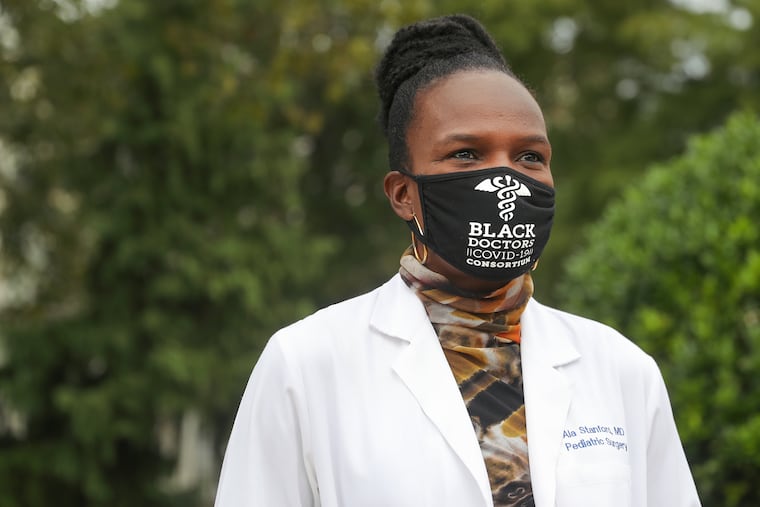Philly experts on what’s ahead for the virus | Coronavirus Newsletter
Plus, workers say they’re defenseless when customers don’t wear masks

TL;DR: For at least the next half-year, experts agree, pandemic precautions will still be very much with us. Inquirer reporters spoke with a local surgeon, a nursing leader, and scientists to get expert perspectives on what lies ahead. As businesses slowly reopen, low-wage service workers say their employers have largely left them to fend for themselves against customers who don’t wear a mask.
— Kelly O’Shea (@kelloshea, health@inquirer.com)
What you need to know:
🍴 Indoor dining expanded to 50% capacity on Monday across Pennsylvania, with the exception of Philadelphia, where capacity remains at 25%.
⚠️ The Centers for Disease Control and Prevention updated its official guidance to warn the “main way” the coronavirus spreads is through airborne particles. But hours later, the agency said the update was posted by mistake and has been removed.
🚬 People with substance use disorder — especially involving opioids or tobacco — are at a significantly higher risk for contracting COVID-19, a new study funded by the National Institutes of Health found.
⚽ Pennsylvania Gov. Tom Wolf vetoed a bill that would give Pennsylvania schools the sole authority to determine whether to play sports and allow spectators at games.
👨🏻🏫 Across the region, substitute teachers are in high demand that could increase as school districts scramble to find replacements for regular teachers who are reluctant to return to the classroom.
💰 The coronavirus has caused a coin shortage in the United States, and the Philadelphia Mint is working overtime to make up for it.
🎒 Washington Township High School in Gloucester County is pushing back the start of in-person classes until at least Thursday after a “large gathering” of maskless seniors occurred over the weekend.
📰 What’s going on in your county? We organized recent coverage of the coronavirus pandemic by local counties mentioned in the stories to make it easier for you to find the info you care about.
Local coronavirus cases
📈The coronavirus has swept across the Philadelphia region and cases continue to mount. The Inquirer and Spotlight PA are compiling geographic data on tests conducted, cases confirmed, and deaths caused by the virus. Track the spread here.
With 2020 dominated by a deadly, unpredictable virus that no one had even heard of a year ago, most of us would rather look forward — to the day we go back to normal — than back. But for at least the next half-year, experts agree, pandemic precautions will still be very much with us. Inquirer reporters spoke with a local surgeon, a nursing leader, and scientists to get expert perspectives on what lies ahead. Read more here.
As shutdown orders lift and businesses slowly reopen, low-wage service workers say their employers have largely left them to fend for themselves against customers who believe it’s their constitutional right not to wear a mask. Employers' refusal to enforce mask-wearing and social-distancing — or their decision to add enforcement to a list of responsibilities for low-wage security guards or retail workers — is yet another workplace safety issue for workers during the pandemic, and one that’s become deadly.
Helpful resources
Symptoms of COVID-19, flu, common cold, and allergies can overlap. How to tell the difference.
If you’ve hit a COVID-19 wall, here are ways to cope.
The coronavirus is mainly transmitted through the air. Here’s how to tell if your ventilation is OK.
How does the virus affect your entire body?
Here’s what to know about traveling safely during the pandemic.
You got this: Spooky sights
Many local Halloween attractions are finding a way to open this year, offering socially distanced haunts, requiring masks, and posting hand-washing instructions in horror-themed fonts. Others will be ghost towns. At “Field of Screams” additional restrictions have been placed on employee interaction with customers, meaning the zombies and ghouls won’t be as close. Read more here.
🛍️ Several local shopping malls, including Fashion District Philadelphia and the Cherry Hill Mall, will expand their hours next week as customers continue to return to stores.
🌍 What will the pandemic do to our sense of boundaries, my colleague Amy Rosenberg asks. And when will we resume our pre-COVID-19 travel habits?
💻 Anthony Fauci, the nation’s leading infectious disease expert and a member of the White House coronavirus task force, will join N.J. Gov. Phil Murphy for a Facebook Live chat on Thursday.
Have a social distancing tip or question to share? Let us know at health@inquirer.com and your input might be featured in a future edition of this newsletter.
What we’re paying attention to
Stat shares how Pinterest beat back vaccine misinformation — and what Facebook could learn from its approach.
Staff at donation centers for plasma — a potential COVID-19 therapy touted by the Trump administration — say conditions aren’t safe, ProPublica reports.
Following the death of Supreme Court Justice Ruth Bader Ginsburg, judicial threats to the ACA and reproductive rights heighten, Kaiser Health News writes.
Enjoy getting our journalism through email? You can also sign up for The Inquirer Morning Newsletter to get the latest news, features, investigations and more sent straight to your inbox each morning Sunday-Friday. Sign up here.